“…seid bereit – Immer bereit"
("…be ready - always ready")
By Jacquelyn Marie Shannon
We showed up at the party wearing blue t-shirts and neckerchiefs like those once
worn by the young pioneers, East Germany’s version of scouting. It wasn’t just any party
though, it was a GDR party. Among youth in Germany, easterners and westerners alike,
there is a phenomenon called Ostalgie, or nostalgia for the east. I suddenly found
myself in head-on collision with this new trend as I walked in to the old Jugendklubhaus,
a building once used for state-sponsored social events for youth when Matt’s host
parents were teenagers. Everyone had arrived dressed up as if the wall had never
fallen. I saw everything from members of former communist youth organizations to
members of the East German military and creative versions of Erich Honecker. Old
commie flags garlanded the walls alongside portraits of Marx and Che and music from
old GDR rock bands like The Phudys played mixed in with Russian beats and other
music that would have been approved by the SED. Matt and I joined a group of his
friends from the local gymnasium and helped ourselves to some Russian vodka and the
old GDR cola Club. Many of the old products from the GDR have once again become
popular and many prefer the nostalgic brands that have made a comeback such as
Spreewald pickles and Moccha-fix Gold coffee. When the wall first fell, everyone wanted
to get rid of anything that would connect them to the east and ran out to buy bananas
and Levis. Now these same bits and pieces are being paraded and hung up on the walls as decorations.
A drunken karaoke session broke out in the back corner to L’Internationale, a
familiar tune, but in a language I couldn’t fully understand.
„Volker, hort die Signale!
Auf, zum letzten Gefecht!
Die Internationale
Erkampft das Menschenrecht.“
Overwhelmed, I asked one of Matt’s friends, a true ossie, what he made of the
ostalgia frenzy. “Would you prefer to return to as it were in the GDR?” I asked. “It’s not
about wanting to return to the past as it was in the GDR really,” he answered, “but to a
time when people had dreams and were hopeful…”
The poetic answer he gave to my question felt out of place amongst a backdrop
of schlagermusik, the stench of sweat and vodka, and old party officials and young
pioneer girls groping each other on the dance floor.
“…a return to a time when we dreamt of crossing new frontiers. You know
frontiers, you’re from Texas.” He took my lack of reply as my agreeing with him, though I
realized that we, too, no longer have frontiers to dream of crossing.





